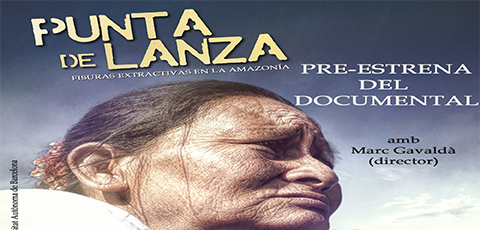Screening of the documentary about the threat on the Amazonian people in Bolivia
On 18th March, the UAB screens “Punta de Lanza” a documentary of the association Alerta Amazónica. This documentary focuses on the northern Bolivian Amazonia, where several extractive projects threaten the peoples who live in its forests.

UPDATE13/03/20: The screening of the documentary is postponed until further notice
On 18th March at 4 pm, “Punta de Lanza” will be screened at the UAB Cinema, a documentary of the association Alerta Amazónica, which has been co-funded by the UAB Solidarity Fund.
“Punta de Lanza” deals with the issues in northern Bolivian Amazonia, where several extractive projects threaten the peoples who live in its forests. New roads, seismic exploratory works and forestry concessions go forest inside, rounding up the Tacana people territory. In the middle of these circumstances, the appearance of peoples in voluntary isolation could change the situation.
Marc Gavaldà is the director of the documentary. He is a UAB researcher specialized in environmental conflicts in the Amazonian region. In this documentary, he immerses himself in the territory of the Tacana people, at the northern border of Bolivia. It is an unexploited woodland, where the construction of new access ways and the exploitation of resources are rounding up the indigenous people. In this expansion of the extractive frontiers new civilizations that were unknown so far appeared, whose life is in danger due to the silencing of some companies and the government.
The documentary is under the framework of the project “Deforestation at the Bolivian Amazonia. Research, documentation, and teaching with Bolivian public Universities”. It aims to keep the collaborative relationships between the universities UMSS of Cochabamba and the UAB in terms of teaching; establish a collaborative relationship with the public university of La Paz UMSA; and organize a research team to analyze the impact of the roads construction project of Ixiamas-Porvenir, which will affect several protected areas and indigenous territories of the Bolivian Amazonia.